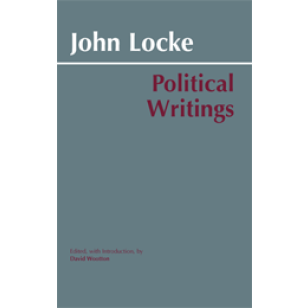Locke: The Political Writings
This comprehensive collection brings together the main published works (excluding polemical attacks on other people’s views) with the most important surviving evidence from among Locke’s papers relating to his political philosophy. David Wootton’s wide-ranging and scholarly Introduction sets the writings in the context of their time, examines Locke’s developing ideas and unorthodox Christianity, and analyzes his main arguments. The result is the first fully rounded picture of Locke’s political thought in his own words.
eBook available for $15.50. Click HERE for more information.
A reprint of the Penguin/Mentor edition of 1993.
John Locke’s Second Treatise of Government (c. 1681) is perhaps the key founding liberal text. A Letter Concerning Toleration, written in 1685 (a year when a Catholic monarch came to the throne of England and Louis XVI unleashed a reign of terror against Protestants in France), is a classic defense of religious freedom. Yet many of Locke’s other writings—not least the Constitutions of Carolina, which he helped draft—are almost defiantly anti-liberal in outlook.
This comprehensive collection brings together the main published works (excluding polemical attacks on other people’s views) with the most important surviving evidence from among Locke’s papers relating to his political philosophy. David Wootton’s wide-ranging and scholarly Introduction sets the writings in the context of their time, examines Locke’s developing ideas and unorthodox Christianity, and analyzes his main arguments. The result is the first fully rounded picture of Locke’s political thought in his own words.
Contents:
Acknowledgements. Preface. Introduction. Suggestions for Further Reading. A Note on the Texts.
1. Letter to S. H. [Henry Stubbe] (mid-September? 1659).
2. Letter to Tom (20 October 1659).
3. From: ‘Question: Whether the civil magistrate may lawfully impose and determine the use of indifferent things in reference to religious worship. Answer: Yes’ (First Tract on Government, 1660).
4. ‘Preface to the Reader’ from the First Tract on Government (1661).
5. ‘Question: Can the civil magistrate specify indifferent things to be included within the order of divine worship, and impose them upon the people? Answer: Yes’ (Second Tract on Goverment, c. 1662).
6. ‘Question: Is each man’s private interest the foundation of the law of nature? Answer: No’ (Essays on the Law of Nature, No. VIII, 1664).
7. Letter to the Hon. Robert Boyle (12/22 December 1665).
8. An Essay Concerning Toleration (1667).
9. The Fundamental Constitutions of Carolina (1669).
10. ‘Philanthropy, or the Christian Philosophers’ (1675).
11. ‘Obligations of Penal Laws’ (Journal, 25 February 1676).
12. ‘Law’ (Journal, 21 April 1678).
13. ‘Credit, Disgrace’ (Journal, 12 December 1678).
14. ‘The Idea We Have of God’ (Journal, 1 August 1680).
15. ‘Inspiration’ (Journal, 3 April 1681).
16. ‘Virtus’ (1681, from the 1661 Commonplace Book).
17. From The First Treatise of Government (c. 1681):
Chapter Five: Of Adam’s Title to Sovereignty by the Subjection of Eve;
Chapter Nine: Of Monarchy by Inheritance from Adam.
18. ‘Two Sorts of Knowledge’ (Journal, 26 June 1681).
19. The Second Treatise of Government (c. 1681).
20. Letter to Edward Clarke (27 January/6 February 1685).
21. A Letter Concerning Toleration, trans. William Popple (1685).
22. Letter to Edward Clarke (29 January/8 February 1689).
23. Preface to Two Treatises of Government (1689).
24. ‘Labour’ (1693; from the 1661 Commonplace Book).
25. ‘Venditio’ (1695, from the 1661 Commonplace Book).
26. Draft of a Representation Containing a Scheme of Methods for the Employment of the Poor. Proposed by Mr. Locke, the 26th October 1697.
Bibliography. Index.
About the Author:
David Wootton is Anniversary Professor of History, University of York. His translations of Machiavelli (The Prince and Selected Political Writings), Thomas More (Utopia), and Voltaire (Candide and Related Texts) are also published by Hackett Publishing Company.







